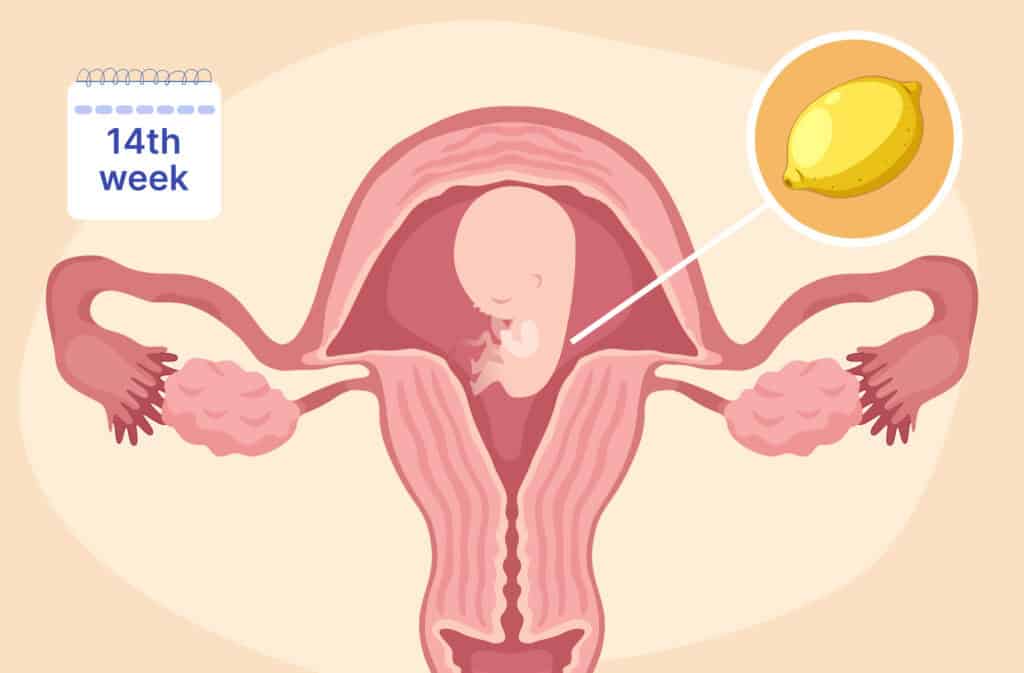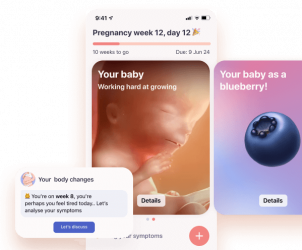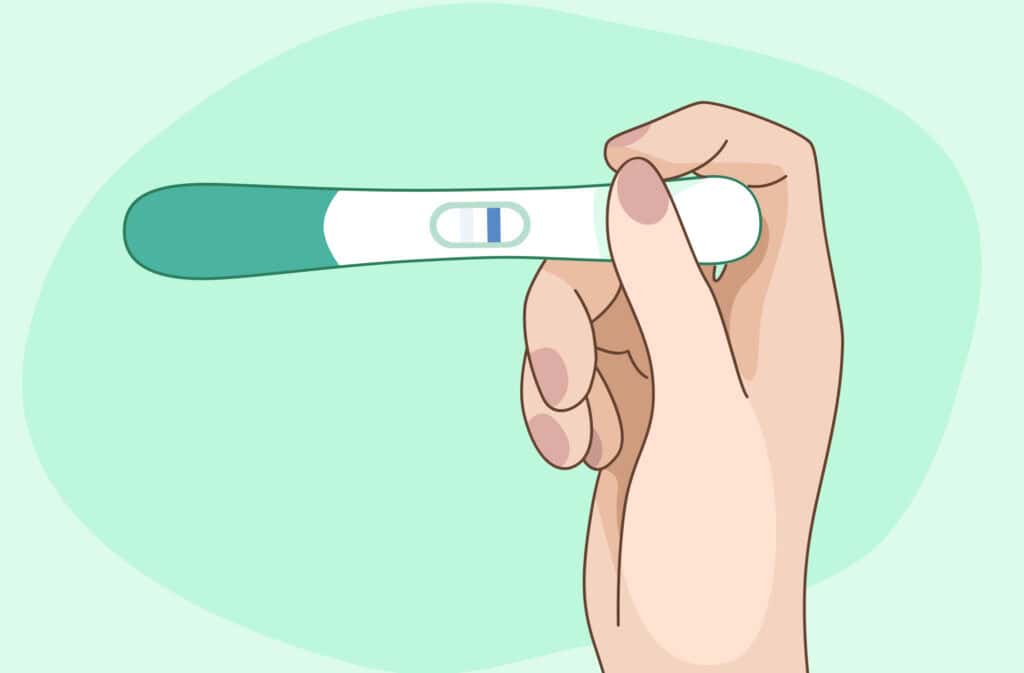Femia > Health Library > Pregnancy > Pregnancy week by week > 14 weeks pregnant: Baby’s size, bump beginnings, and self-care tips
14 weeks pregnant: Baby’s size, bump beginnings, and self-care tips

- Updated Feb 27, 2025
- Published
CRAFTED BY HUMAN
Crafted by human At Femia, we provide accurate and up-to-date information at every stage of your journey, from trying to conceive, pregnancy and postnatal support. All content is created by a real person based on in-depth research and own professional experience. Femia ensures that you will receive expert advice, strict accuracy and a personalized approach from our authors/medical experts. Learn more about our editorial policy.
FACT CHECKED
Fact checked At Femia Health, we maintain the highest standards of editorial excellence in delivering content focused on helping you conceive, guiding you through pregnancy, and supporting you postpartum. Explore our content review principles to learn how we ensure the accuracy and quality of our health and lifestyle tips for every stage of your journey.
At 14 weeks pregnant, your baby’s features are becoming more detailed, and their body is lengthening. You may feel more energetic as symptoms like nausea start to ease, and some women notice a small bump beginning to show.
Welcome to 14 weeks pregnant and the start of your second trimester! This week, your baby’s growth continues rapidly as organs develop. Let’s dive into what to expect this week, from fetal development to symptoms and self-care tips.

Pregnancy symptoms at 14 weeks
The second trimester often brings changes in symptoms, with some early discomforts easing. Here’s what you may experience at 14 weeks:
Goodbye morning sickness?
By now, you might notice your energy returning, and the morning sickness that plagued you earlier in pregnancy may be fading. For many women, nausea subsides as they move into the second trimester. However, if nausea or vomiting persists, make sure to discuss it with your healthcare provider at your next check-up.
Beginning to show
At 14 weeks, your uterus is rising above your pubic bone, which could be starting to show through your clothes. This visible change can be exciting, signaling that your baby is growing and your pregnancy is becoming more noticeable. If you’re curious about how others look at this stage, check out photos from our pregnancy gallery.
Bleeding gums
Many pregnant women experience pregnancy gingivitis, a condition where gums become swollen and bleed during brushing or flossing. This is due to hormonal changes that increase gum sensitivity. Be sure to maintain your oral health by brushing twice a day and flossing daily to manage this issue.
Round ligament pain
As your uterus grows, the ligaments supporting it stretch and thicken, leading to discomfort or sharp pains, especially when you move suddenly. This round ligament pain is common and typically resolves with rest, good posture, or a warm bath. Some women find wearing a maternity belt helpful for additional support.
Increased appetite
With the second trimester comes a surge in hunger. Your body needs more calories to support your growing baby and the changes happening in your own body, like increased blood volume and fat stores. Aim to add 300 to 350 extra calories each day, and focus on nutritious foods to fuel both you and your baby’s growth.
👉Find out more: Week 13 pregnancy: Fetal development, new symptoms, and bump progress
Your body at 14 weeks pregnant
At 14 weeks, your body is undergoing significant changes as your pregnancy progresses. Your uterus is growing and may start pushing above your pelvic bone, which can result in a noticeable bump. As your hormone levels start to level out, many women experience a reduction in early pregnancy symptoms such as nausea and mood swings, giving way to a newfound sense of energy. Blood flow is increasing, which can help you feel more vibrant, and some women start to notice changes in their skin and hair.
You might also notice changes like the darkening of your skin, including the appearance of the linea nigra, a dark vertical line that runs down your belly, and melasma, which are dark patches that can appear on your face. These changes are a result of hormonal shifts and are temporary. Staying hydrated, moisturizing your skin, and eating a well-balanced diet can help you manage these changes and feel more comfortable during this exciting phase of pregnancy.
14-week pregnant belly
A 14-week belly may start to be noticeable for some, especially if this isn’t your first pregnancy. The uterus is growing and moving upward, creating a subtle bump, but visibility varies depending on body type, muscle tone, and other factors.
Baby development at 14 weeks
- Facial expressions. Your baby’s brain is sending impulses that allow their facial muscles to work, making it possible for them to express small movements like squinting, frowning, or even grimacing. At this stage, your baby is also practicing essential movements like sucking and chewing, preparing for feeding after birth.
- Hair growth. Hair follicles are beginning to form beneath your baby’s skin, and fine, soft baby hair is in the early stages of development. By around 20 weeks, this hair will start to appear, including fine downy strands on the eyebrows, upper lip, and chin.
- Movement and flexibility. While you won’t be able to feel them just yet, your baby is already very active, with flexible hands and feet that allow for small movements. These early kicks and punches are signs of your baby’s growing muscle development.
- Rapid growth. This week, you may notice a significant increase in your baby’s size compared to last week. This isn’t a dramatic doubling of length but rather a shift in how fetal size is measured—transitioning from crown to rump to a head-to-toe measurement as your baby grows.
14-week baby size
The 14-week fetus size is around 3.5 inches long, roughly the size of a lemon, and weighs about 1.5 ounces. This week marks a growth spurt, as the baby’s body begins to catch up in proportion to the head.
14-week ultrasound
A 14-week ultrasound can provide a clear view of your baby’s developing features. During a 14-week ultrasound 3D scan, you may notice your baby’s head, limbs, and torso more distinctly, as well as any tiny movements like stretching or turning. Although it’s still early, some providers may attempt to determine the baby’s gender around this stage.
Real 14-week fetus
A real-life 14-week fetus is growing quickly, with tiny limbs, hands, and feet becoming more visible. Facial features are more distinct, and the baby is practicing movements like thumb-sucking and facial expressions, which will be refined over the coming weeks.

14 weeks pregnant: Tests to expect
- Quad screen (optional)
The quad screen, typically done between 15–22 weeks, measures four substances in the mother’s blood to assess the risk of certain genetic conditions and neural tube defects:
- Alpha-fetoprotein (AFP): High levels can indicate neural tube defects like spina bifida, while low levels may suggest chromosomal conditions such as Down syndrome.
- Human chorionic gonadotropin (hCG): Abnormal levels may point to conditions like Down syndrome or Edwards syndrome.
- Estriol: Low levels may signal potential genetic disorders.
- Inhibin-A: Elevated levels may be associated with Down syndrome.
This non-invasive test helps identify pregnancies at higher risk for conditions like Down syndrome (Trisomy 21), Edwards syndrome (Trisomy 18), and neural tube defects. However, it does not provide a definitive diagnosis, and further tests (such as amniocentesis or ultrasound) may be recommended if results are concerning.
- Urine Test
Routine urine tests at 14 weeks are essential for detecting potential complications:
- Protein: Elevated protein may indicate urinary tract infections (UTIs) or, later in pregnancy, preeclampsia.
- Glucose: High levels can be an early sign of gestational diabetes, especially with risk factors like a high BMI or family history.
- Leukocytes and nitrites: These suggest a UTI, which, if untreated, can increase the risk of preterm labor.
- Ketones: Found in cases of severe nausea or vomiting, indicating possible dehydration or malnutrition.
Regular urine screenings help monitor complications like gestational diabetes, preterm labor, and preeclampsia, ensuring early detection and better management for both mother and baby.
👉Find out more:
15 weeks pregnant: Baby’s growth, bump progress, and what to expect
Reaching week 16: Baby’s development, your changing belly, and health tips
Health tips and self-care at 14 weeks pregnant
Stay hydrated
Drinking plenty of water is essential for both you and your baby. Hydration helps support increased blood volume, assists with digestion, and can reduce swelling and constipation. Aim for at least 8–10 glasses of water per day, and increase your intake if you’re physically active or in hot weather.
Maintain a balanced diet
Focus on nutrient-dense foods that will support your baby’s rapid development. Include lean proteins, whole grains, fruits, vegetables, and healthy fats in your daily meals. Make sure you’re getting enough folic acid, iron, calcium, and omega-3 fatty acids to support your baby’s growth and development. Small, frequent meals may help manage any lingering nausea or food aversions.
Gentle exercise
Engaging in low-impact exercises, such as walking, swimming, or prenatal yoga, can help improve circulation, reduce swelling, and boost your energy levels. Regular exercise will also help alleviate common pregnancy discomforts, such as back pain and fatigue. Just be sure to listen to your body and avoid overexertion. Always consult your healthcare provider before starting a new exercise routine.
Skincare and moisturizing
Hormonal changes during pregnancy can cause changes to your skin, including stretch marks and melasma (dark spots). Apply a good moisturizer to your belly, hips, and breasts to keep your skin hydrated and reduce itching. You can also use sunscreen to prevent darkening of spots from sun exposure, especially if you’re experiencing melasma.
Prioritize rest
Getting enough rest is essential during pregnancy, especially as your body continues to adapt to the changes of growing a baby. If you’re feeling tired, take naps, and avoid over-scheduling yourself. Ensure that your sleep environment is comfortable, and try to sleep on your left side to improve circulation to your baby.
Mind your posture
As your belly grows, it’s essential to maintain good posture to avoid back and neck strain. Try sitting with your back supported and keeping your feet flat on the ground when sitting. When standing, avoid locking your knees and stand with your weight balanced evenly on both feet. Consider using a pregnancy pillow or support band if needed to relieve pressure.
Mental health
Pregnancy can bring a range of emotions, from excitement to anxiety. Don’t hesitate to talk about your feelings with your partner, a friend, or a healthcare provider. Practice relaxation techniques such as deep breathing, meditation, or mindfulness to manage stress and improve your mental well-being.
Questions from the Femia community
How to deal with dry and itchy skin?
Use a gentle, fragrance-free moisturizer daily, stay hydrated, and avoid hot showers, as they can further dry out your skin.
How often should I do pelvic floor exercises?
Pelvic floor exercises can be done daily, with most experts recommending about 5-10 minutes of Kegels each day to strengthen muscles.
How can I manage round ligament pain?
Rest, gentle stretching, and avoiding sudden movements can help ease round ligament pain. Wearing a belly band may also provide support.
What are the signs of a healthy pregnancy at 14 weeks?
Signs of a healthy pregnancy at 14 weeks include a growing belly, an increase in energy, reduced nausea, and the absence of severe pain or bleeding. Your baby’s heart rate can be detected, and you may start feeling some gentle movements later in the trimester.
What should I avoid at 14 weeks pregnant?
At 14 weeks, avoid smoking, alcohol, and exposure to harmful chemicals. It's also important to avoid heavy lifting or strenuous physical activities that could strain your body.
How should I lay at 14 weeks pregnant?
At 14 weeks, it's generally best to sleep on your left side to improve circulation to your baby and avoid lying flat on your back for long periods, as it can pressure certain blood vessels.
The bottom line
At 14 weeks pregnant, your baby is growing quickly, with features becoming more distinct as they continue to develop. You may notice increased energy and a slight bump as your body adapts to the second trimester. Focusing on balanced nutrition, hydration, and light exercise can support your health and well-being as your pregnancy progresses.
References
- “14 Weeks Pregnant: Symptoms, Baby Development & Tips.” BabyCenter, www.babycenter.com/pregnancy/week-by-week/14-weeks-pregnant.
- “Week 14 of Pregnancy: Symptoms, Baby Development & More.” What to Expect, www.whattoexpect.com/pregnancy/week-by-week/week-14.aspx.
- “14 Weeks Pregnant: Baby Development, Symptoms & Tips.” NHS, www.nhs.uk/pregnancy/week-by-week/1-to-12/14-weeks/.
- “Pregnancy Week 14: What to Expect.” American Pregnancy Association, www.americanpregnancy.org/healthy-pregnancy/week-by-week/14-weeks-pregnant/.

Discover 7 natural ways to boost fertility in women. Learn about diet, lifestyle changes, and timing intercourse. Expert tips to increase your chances of getting pregnant.

If you have a faint line on pregnancy test line, you’re probably confused. A faint line on a pregnancy test usually means you’re pregnant, though there are exceptions.

Can you ride roller coasters while pregnant? Learn the risks of sudden drops and turns, including potential complications like placental abruption and miscarriage.

